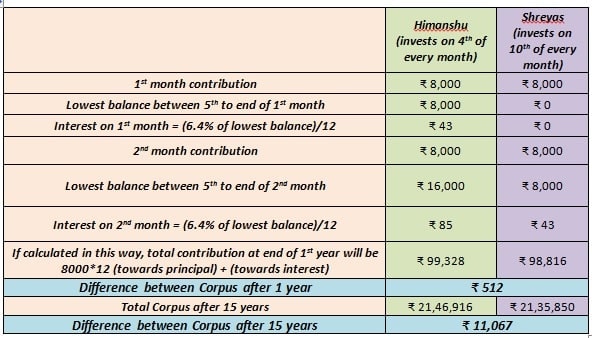Among various investment options available, PPF (Public Provident Fund) is one of the most popular ones. In this article, I will detail few key things you should know about PPF – What are the PPF interest rates for 2021, How PPF interest is calculated, How to get max benefit out of PPF and Should you deposit money in PPF before 5th of every month?
What are the PPF interest rates for 2021
PPF interest rates are fixed by Government of India every quarter. PPF Interest Rates for 2021 (for Apr-May-June quarter) has been set to 7.1% (was reduced to 6.4% but then rolled back) per annum. Earlier rate for Jan-Feb-Mar was 7.1%.
How PPF Interest is calculated
PPF interest is calculated on a monthly basis but credited to your PPF account at end of the year.
For interest calculation, the bank checks your balance between 5th and end of the month. Interest for a particular month is calculated on the lowest balance between this duration.
To understand how PPF interest is calculated, let us look at an example. Assume your PPF balance on 5th is 1 Lakh and you add 50K on 6th. Since the lowest balance in your account between 5th and end of the month is 1 Lakh, interest will be calculated only on 1 Lakh for that month instead of 1.5 Lakh.
How to get max out of PPF
One of the strategies recommended by many on how to get max out of PPF is to invest before 5th of every month. Logic behind this recommendation is based on the point we discussed in How PPF Interest is calculated section – interest rate is given on lowest balance between 5th and end of month.
But is this recommendation worth it? Below illustration shows how much benefits can be obtained by implementing the logic of investing before 5th.
Himanshu and Shreyas are two friends. Both regularly deposit in PPF. Himanshu invests 8K on 4th of every month while Shreyas invests 8K on 10th of every month. Assuming constant PPF returns of 6.4%, let us see how much corpus they can build after 1 year and after 15 years.

Similar calculations for One time investments instead of regular SIP again give the difference of 11,067/- after 15 years.

If we collate the results, we get following table.

From this, we can conclude that max corpus can be made by investing as one time amounts before 5th of every month.
Should you deposit money in PPF before 5th of every month?
While the numbers above appear significant, remember that these are the benefits you will realize after 15 years. If we calculate the present value, then 11K turns to 4.3K while 60.8K turns to 24K

For one-time payments, depositing money before 5th of 1st month does make substantial difference. But not everyone has that much money to invest as one-time. For monthly investments I don’t think it is wise to wait for 15 years to get 4364/- benefits. You can easily achieve/exceed this saving via other products.
Another disadvantage is that with rising inflation, a PPF return of 7.1% 6.4% is hardly enough to help you retire. You will need to focus on options giving higher returns. Stocks, MF, NPS, Bonds etc are better alternatives as they give higher returns and are not very risky in long run.
However, not everything is bad for PPF users. One should still invest if they have PPF account in the name of kids. By the time lock-in period ends, they will have a good corpus to fund at least part of higher education.
PPF can also help you in times of emergencies and special situations (like marriage, house purchase etc). Instead of going for a personal loan at high interest rates, it is wise to withdraw from the PPF corpus.
Conclusion
Investing before 5th vs investing after 5th will not benefit much in long run (11K after 15 years in our example). And investing as one time vs monthly will have moderate benefits (60.8K after 15 years in our example). There are better alternates available in the market to beat these returns.
So think carefully and follow a goal-based approach to invest in PPF (instead of tax-saving based approach). If you are saving for children (for whom there are not many options to invest), invest in PPF. But if you are saving for retirement, look at other options.
Liked this article? Join my Whatsapp group to be part of our community!
Other articles worth reading:
Credit cards => 21 Tips on how to use Credit Cards to maximize their potential
Financial Freedom => Is 1 Crore retirement corpus enough?
Income Tax => New Income Tax Slabs for FY 2020-21: Are they useful?
Feel free to share this article by clicking on the below icons…
Featured Image Source
